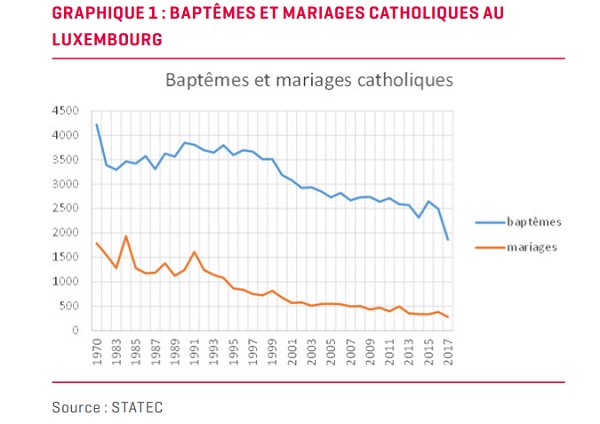
STATEC, Luxembourg's national statistics agency, has published a report on the rise/decline of religion and spirituality in the Grand Duchy of Luxembourg.
The six-page report notes the decline of religious practices and the rise of alternative spirituality in Luxembourg.
Those claiming traditional religious beliefs and practices, particularly Catholicism, have fallen sharply, from 75% to 48% between 2008 and 2021. The importance of religion has also fallen during the same period from 42% to 24%. On the other hand, the share of atheists and "sans religion" has increased significantly. However, this secularisation is accompanied by alternative spiritual aspirations. More than 40% of people believe in a spirit or a superior force, 15% think that a personal person exists and more than 20% declare themselves atheists.
In Luxembourg, statistics on religious affiliation, spiritual practices and philosophical orientations are not the subject of official statistical surveys. STATEC traditionally collects information on certain rites such as baptisms and religious weddings. It only has access to data on public expenditure devoted to "sport, leisure and religion".
The number of Catholic baptisms and marriages has decreased continuously during the past decades, despite a strong increase in the population (see graph below).

However, spiritual phenomena, of which religions are a part, have been part of the human adventure since its origins. Religion is a complex cultural, political and economic reality that has shaped society for millennia. It is associated with positive tropisms such as charitable works, compassion with the weakest or consolation before death. It is also linked to negative elements such as sexual and clothing misogynistic prohibitions, religious wars in the 16th and 17th centuries, the inquisition and the recent jihad.
Religion is not important for more than three quarters of the people
This result of the survey is corroborated by a similar Eurobarometer survey, carried out at the same time, which reports that 36% of Europeans declare that religion is important against 36% who do not give it much importance. The insignificance of religion is very marked.
Belonging to a religious denomination concerns less than half of the people questioned (48%). Among the latter, the Catholic religion is largely dominant, totaling 85.3% of those belonging to a religion. Christians are largely in the majority if all reformed ones are included (92%). Those who count themselves as Muslims, attain just than 2.7%. In the total population, Catholics represent 41% of the population questioned (Christians 44%). The survey also reveals that two thirds (67%) of people belonged to a religious denomination when they were 12 years old. Religious affiliation has therefore largely decreased (19 percentage points) over the years.
In conclusion
The number of adherents of various traditional religious denominations has decreased sharply in the Western world, including in Luxembourg, but it has increased in developing countries, driven by the demographic expansion of these regions. Even in Europe, there are certain countries, especially in the east and south, which are still strongly attached to religious principles. Luxembourg is one of the most secular countries - accounting for less than a quarter of the people for whom religion is important - but around 40% believe in a supernatural force.








